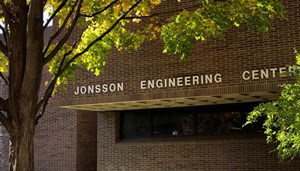RPI’s co-founder and first senior professor, Amos Eaton, developed a teaching theory and methodology that focused on “the application of science to the common purposes of life.” Students went on field trips to gather specimens, performed experiments in laboratories, and prepared and delivered their own lectures. This was a radical idea at a time when college largely consisted of learning by rote.
Experiential learning is now widely regarded as an essential part of higher education, but RPI continues to be at the forefront of pedagogical innovation. One component of this is how much freedom and support you’ll have to follow your own interests.
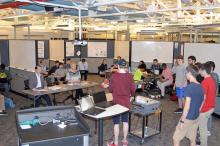
The Design Lab
The O.T. Swanson Multidisciplinary Design Laboratory (Design Lab) provides clinical real-world experiences that integrate discipline-specific knowledge with engineering practice on challenging, multidisciplinary design projects. The Design Lab process provides a capstone experience intended to prepare students to enter the workforce. The projects are open-ended, technically challenging design problems that address a broad array of important contemporary issues. In addition to identifying an important problem, sponsors provide a significant grant and interact directly with the students, faculty, and staff who work to provide design solutions.
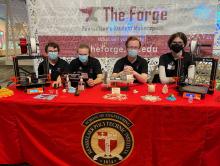
The Forge
The Forge is a student-managed facility that promotes and fosters an inclusive, collaborative design and innovation community. Sponsored by the School of Engineering and the Manufacturing Innovation Learning Lab, the Forge provides a maker environment to support innovation, collaboration, and proof of concept modeling to enhance the educational process for students, and provides the resources to support student creativity and innovation. Its resources are available to anyone who joins.
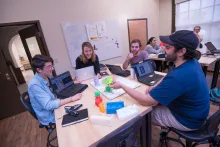
The Inventor’s Studio
Through a three-course sequence, the MANE.Innovation Spine, offered by the Department of Mechanical, Aerospace, and Nuclear Engineering, provides an end-to-end process combining creativity (critical thinking, collaboration, and communication), invention, design, and implementation. Success is measured by the value added, including quality and productivity value, of its innovative products, processes, and services in the commercial world. Students who have taken a course in the Inventor’s Studio sequence are eligible to apply for the annual Innovator and Startup Founder Awards.
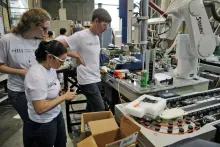
The Manufacturing Innovation Learning Lab (MILL)
The MILL is a forward-looking manufacturing learning environment supported by experienced instructors, industry-grade equipment, and new maker/tinker tools, including those necessary for micro- and nanomanufacturing, for our students. The MILL is sponsored by industrial partners and maintains strong ties with top manufacturing companies. Student teams from the MILL have won top prizes at the American Society of Mechanical Engineers (ASME) Student Design and Manufacturing Competitions.
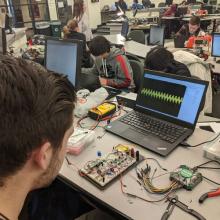
The Douglas A. Mercer ’77 Innovation and Exploration Laboratory (Mercer XLab)
The Mercer XLab fosters a learning ecosystem that actively engages faculty, students, and staff in an educational experiment to amplify the learning experience of RPI students. It provides intentional spaces to build innovations, find collaborations, share technical tools, and aggregate results from the explorations of participants to multiply the impact of innovators.
